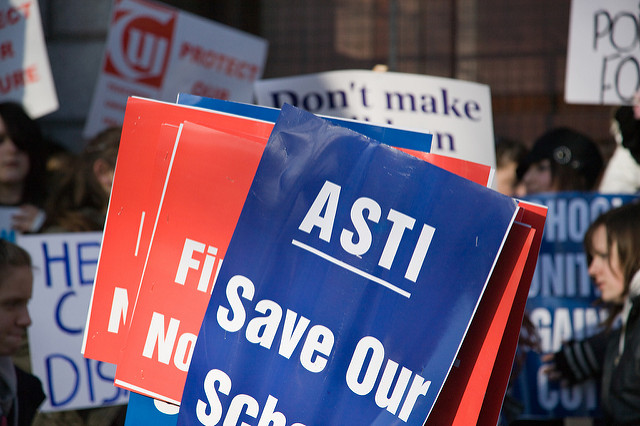Education
Primary, Post Primary, Third Level and Continuing Education
The Workers’ Party believes that our education system must be developed on an egalitarian, democratic, and secular basis.
One of the hallmarks of the Irish education system is the huge discrepancy that exists between schools at both first and second level in relation to ethos, pupil background, the manner and extent of resourcing, facilities and the academic progress of students. This discrepancy is reflected in the profile of entrants to third level institutions highlighted by the media each year. Research shows that it is generally the students from better off backgrounds who make it to university and who pursue higher level courses.
While schools and colleges in areas of social disadvantage try very hard to respond to the challenges inherent in our highly competitive points driven system the odds are stacked high against those children. In addition, only 40% of children from lower socio economic backgrounds attend DEIS, schools where a limited level of enhanced supports are available.
According to the CSO 2015 statistics, one in eight of our children live in consistent poverty and 37% suffer deprivation. Many of those children lack basic necessities and come to school hungry and under-nourished. In our system they are expected to compete with those who can afford to buy the necessary skills to compete successfully in the high points driven Leaving Cert examination, with those who can afford a place in a top performing league table school together with expensive after school and weekend grinds. Many of those schools are private fee-paying schools which are subsidised by the tax payer.
The Workers’ Party opposes the increasing privatisation of our education system. We believe in a public system, paid for through taxation and taken out of the control of the churches and religious bodies.
It is a fundamental principle of the Workers’ Party that all schools receiving state funding must have open access to all children regardless of social, cultural or ethnic background, intellectual ability or religious beliefs. Private fee-paying schools should receive no state funding. Their teaching and support staff should not be paid for by the state and they should not be able to claim tax rebates on voluntary contributions. The collection of ‘voluntary contributions’ should be outlawed in state funded schools and those schools should be prohibited from asking prospective parents for deposits when their child applies for a school place.
- Education should be free to all, including migrant children and asylum seekers, from pre-school up to and including postgraduate studies.
- While it is vital that the state invests adequately in all levels of education it is particularly important to invest in early childhood and primary education. Our primary school class numbers are among the highest in Europe. One quarter of our children are taught in classes of 30 or more pupils and those classes include children with a range of special needs. Our maximum class size should be twenty pupils. There is no provision in the 2016 budget to increase school capitation, yet schools, particularly in less well-off areas, cannot meet basic running costs including water charges.
- Investment in education should be ring-fenced. Its most vulnerable sections – traveller education, English as a second language, DEIS including School Completion Programmes and special needs education should never again become the target of the vicious cuts experienced since 2009.
- The learner/teacher ratio from pre-school to third level should be such as to make learning a quality, accessible, supported, inspiring and meaningful experience.
- Educational requirements, including books and IT equipment, should be provided free at primary and post primary level.
- All students should have access to up-to-date science and technology, language, music, sporting and ICT (including adequate broadband) facilities and students with exceptional potential should have access to facilities which will give them the opportunity to pursue and develop this potential.
- The Workers’ Party opposes a ‘loans’ model of fees & maintenance support. Adequate maintenance grants should be provided for all third level students.
- Financial and learning support, including all the necessary supports required by people with disabilities, should be available to facilitate both young people and adults to re-enter the education system at any stage of their lifetime.
- No work in the education system should be of a precarious / internship / JobBridge nature.
- Research in our universities and institutes of technology should be funded through taxation. Third level teachers should be allowed to get on with the business of teaching and research and freed from the ever increasing pressures of pursuing funding for their departments from private companies.
Read More

